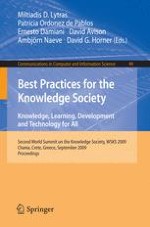It is a great pleasure to share with you the Springer LNCS proceedings of the Second World Summit on the Knowledge Society, WSKS 2009, organized by the Open - search Society, Ngo, http://www.open-knowledge-society.org, and held in Samaria Hotel, in the beautiful city of Chania in Crete, Greece, September 16–18, 2009. The 2nd World Summit on the Knowledge Society (WSKS 2009) was an inter- tional scientific event devoted to promoting dialogue on the main aspects of the knowledge society towards a better world for all. The multidimensional economic and social crisis of the last couple of years has brought to the fore the need to discuss in depth new policies and strategies for a human centric developmental processes in the global context. This annual summit brings together key stakeholders involved in the worldwide development of the knowledge society, from academia, industry, and government, including policy makers and active citizens, to look at the impact and prospects of - formation technology, and the knowledge-based era it is creating, on key facets of l- ing, working, learning, innovating, and collaborating in today’s hyper-complex world. The summit provides a distinct, unique forum for cross-disciplinary fertilization of research, favoring the dissemination of research on new scientific ideas relevant to - ternational research agendas such as the EU (FP7), OECD, or UNESCO. We focus on the key aspects of a new sustainable deal for a bold response to the multidimensional crisis of our times.
